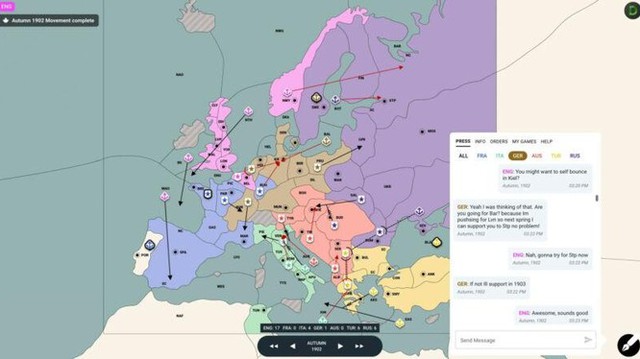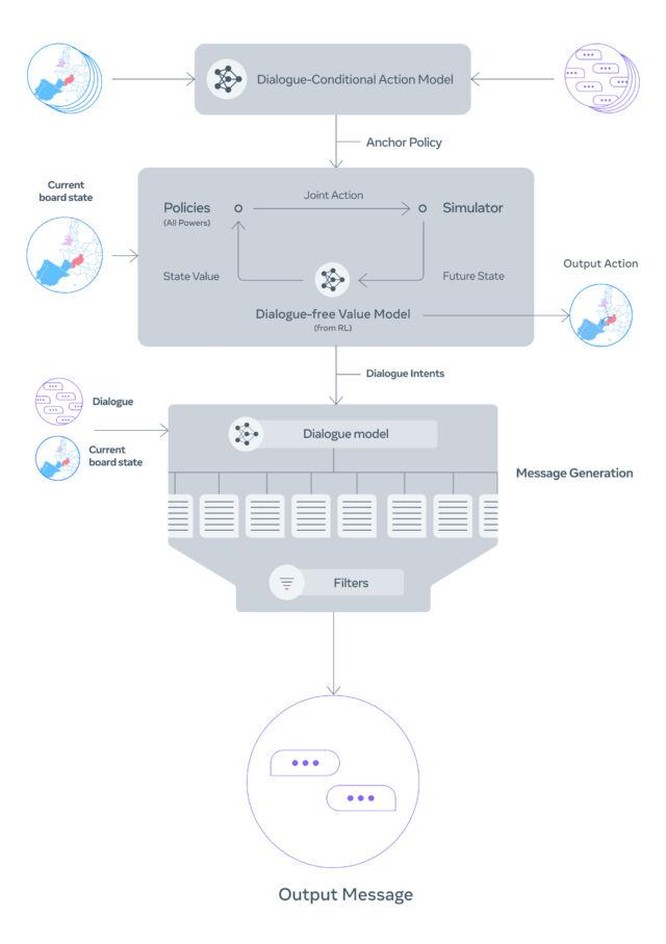Meta team creates AI for the game Diplomacy, negotiation wins over humans
- Tram Ho
On November 22, Meta AI announced the development of Cicero, claiming to be the first Artificial Intelligence (AI) to achieve human-level performance in the strategy board game Diplomacy.
That’s an impressive feat because the game requires deep interpersonal negotiation skills, which suggests that Cicero has achieved a certain level of language proficiency needed to win the game.
Even before Deep Blue beat Garry Kasparov in chess in 1997, board games were a useful measure of AI’s achievements. In 2015, another hurdle fell when AlphaGo defeated Go master Lee Sedol. Both of these games follow a relatively clear set of analytical rules (although the rules of Go are often simplified for computer AI).

A chat in the game Diplomacy between AI and human players. Photo Ars Technica
But with Diplomacy, much of the playstyle involves social skills. Players must show empathy, use natural language, build relationships to win, a difficult task for the computer-player. With this mindset, Meta asks: “Can we build effective and flexible agents that can use language to negotiate, persuade, and work with people to achieve goals?” strategic goals similar to how humans do?”
According to Meta, the answer is yes. Cicero learned his negotiation skills by playing the Diplomacy.net web version of Diplomacy. Over time, the AI became the master of the game, reportedly achieving “more than double the average score” of human players, and ranked first in the top 10% of the best players more than times play.
To create the Cicero software, Meta brought together strategic reasoning AI models (similar to AlphaGo) and natural language processing (similar to GPT-3), integrated into an agent. In each game, Cicero looks at the state of the game board, conversation history, and predicts how other players will act. The AI model generates an execution plan through a language model that can generate human-like dialogue, allowing interaction with other players.

Block diagram of Cicero, a bot that plays Diplomacy, provided by Meta.
Meta calls Cicero’s natural language skills a “controllable dialogue pattern,” which is at the core of Cicero’s personality. Like GPT-3, Cicero uses a large Internet corpus pulled from the web. Meta writes: “ To build a controllable dialogue model, we started with a language model similar to the denoising autoencoder for sequencing models (BART). ) consists of 2.7 billion parameters pre-trained on text from the Internet, fine-tuned on more than 40,000 human games on webDiplomacy.net “.
The resulting model has mastered the subtleties of a complex game. “ For example, Cicero might deduce that, later in the game, the AI will need the support of a specific player ,” says Meta, “ then devise a strategy to win the player’s favor. that, even recognizing the risks and opportunities from that player from a gamer-specific point of view .”
Meta’s Cicero research was published in Science with the title, ” Human-level play in the game Diplomacy by combining linguistic models with strategic reasoning .”
With broader applications, Meta thinks the Cicero research could “remove communication barriers” between humans and AI, like holding up a long conversation to teach someone a new skill. Or it could provide kinetic energy for a video game in which game characters (NPCs) can talk similarly to humans, communicate with gamers, understand player motivations, and adapt. during leveling up.
At the same time, this technology can be used to manipulate people, impersonate people, and defraud in potentially dangerous ways, depending on the context. Based on this awareness, Meta hopes other researchers can build its code “responsibly,” and says the company has taken the necessary steps to detect and remove “malicious messages.” harm in this new domain”, referring to the dialog Cicero learned from the texts on the Internet that have been included, has always been a risk for large language models.
Meta has launched a website, explaining in detail how Cicero works, and also has the open source code of Cicero on GitHub. Online Diplomats fans, maybe even ourselves, need to be very careful on social media because maybe in the near future a Cicero-like version could communicate with us, simply The simplest is convincing about a certain item or more.
According to Ars Technica
Source : Genk
